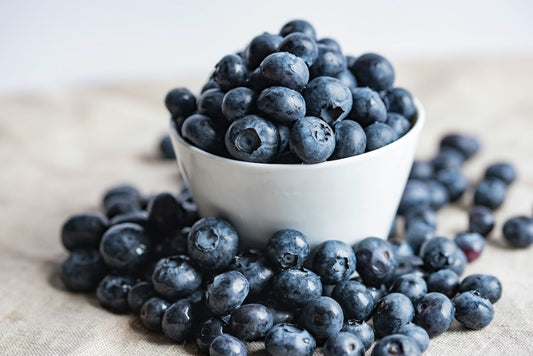Cinnamon is one of the oldest and most popular spices in the world. Not only does it give many dishes a warm and sweet aroma, but it has also been valued in traditional medicine for thousands of years. But how healthy is cinnamon really? In this article, we present 7 benefits that cinnamon can have for your health.
Verival Organic Breakfast – Try it now
1. Cinnamon supports blood sugar levels
Cinnamon is often valued as a natural aid to maintaining stable blood sugar levels, and rightly so. Scientific studies suggest that the ingredients in cinnamon, particularly polyphenols and cinnamaldehyde, can improve insulin sensitivity. This means that the body processes sugar from food more efficiently, thus reducing fluctuations in blood sugar levels. Stable blood sugar levels are not only crucial for our daily well-being, but can also help to reduce the risk of type 2 diabetes in the long term.
What's particularly exciting is that even small amounts are enough. According to studies, half a teaspoon of cinnamon (about 1–2 grams) per day can achieve moderate effects. It is important to use high-quality Ceylon cinnamon, which contains less coumarin than the more common Cassia cinnamon and is therefore a safer choice, even when consumed regularly. Whether in breakfast, tea or smoothies, you can enrich your daily routine in a healthy way with cinnamon.
2. Cinnamon is rich in healthy antioxidants
Cinnamon is full of antioxidants that can make an important contribution to your health. Antioxidants protect your body from free radicals. These are unstable molecules that attack and can damage your cells. This damage is not only associated with accelerated aging processes, but can also increase the risk of chronic diseases.
A special group of antioxidants in cinnamon are the polyphenols. They are not only responsible for the characteristic colour and taste, but are also among the most effective natural antioxidants of all. In a study comparing various spices, cinnamon was rated as one of the top spices with the highest antioxidant content – even ahead of well-known superfoods such as garlic or oregano.
What does this mean for you? Just a small pinch of cinnamon in your daily routine can help to protect your cells and do your body some good. Whether in your breakfast, in hot drinks or as an ingredient in baking recipes – cinnamon combines pleasure with a plus for your health.
3. Anti-inflammatory properties
Chronic inflammation in the body can have a long-term negative impact on health and is associated with diseases such as cardiovascular disease, arthritis and diabetes. Cinnamon contains cinnamaldehyde, a compound that can have an anti-inflammatory effect. This means that cinnamon can help to reduce the so-called ‘silent inflammation’ that often goes unnoticed but puts a strain on the body.
While cinnamon is no substitute for medical treatment, it can help reduce inflammation as part of a healthy diet. Whether you use it for breakfast, in warm drinks or in savoury dishes, cinnamon is a natural way to do your body good.
4. Supports heart health
A healthy cardiovascular system is the basis for our well-being, and cinnamon could make a small but valuable contribution here. Studies suggest that cinnamon can lower LDL cholesterol levels, also known as ‘bad cholesterol’, as well as triglyceride levels. At the same time, the ‘good’ HDL cholesterol remains stable, which is particularly important for heart health. There is also evidence that cinnamon can help people with high blood pressure to lower their blood pressure slightly.
What makes cinnamon so special? The polyphenols and cinnamaldehyde contained in cinnamon support the metabolism and promote better regulation of blood lipid levels. Although these effects are no substitute for medical therapy, they can be a useful part of a conscious and balanced diet.
Whether you use it in a delicious breakfast dish, a warming drink or as an ingredient in savoury dishes, cinnamon not only adds flavour to your plate, but can also do your heart some good. As always, it is important to use it in moderation and preferably with high-quality Ceylon cinnamon.
5. Stress relief and well-being
Cinnamon is not only a flavour highlight, but can also have a beneficial effect on the senses. Its warm, sweet scent is often associated with relaxation and security. Especially in stressful moments, the pleasant smell of cinnamon can help you to take a little time out and promote your well-being.
Whether you use it as a spice for breakfast, in a warming tea or in baking, the scent of cinnamon creates a cosy atmosphere that pampers both body and mind. With every pinch of cinnamon, you can bring a little piece of well-being into your everyday life and enjoy the moment.
6. Cinnamon as a natural flavour enhancer
Sometimes it's the little things that make all the difference – like a pinch of cinnamon. This warm, aromatic spice has the special ability to give food and drinks a pleasant, natural sweetness, harmoniously enhancing their flavours. Without any added sugar, cinnamon not only adds depth of flavour, but also a sense of comfort and enjoyment to every meal.
But cinnamon is much more than just a flavour enhancer. It offers a simple and clever way to integrate conscious enjoyment into your daily routine. Whether in your morning porridge, a refreshing smoothie or even in savoury dishes like curries – cinnamon shows off its versatility and proves that healthy eating doesn't have to be boring. With just a pinch, you can bring out the best in your ingredients while doing something good for yourself.
7. Cinnamon for promoting brain health and concentration
Cinnamon could not only benefit your body but also your brain. A recent study from 2023, published in the Nutritional Neuroscience Journal, examined the possible neuroprotective properties of cinnamon. The results show that certain ingredients such as cinnamaldehyde and cinnamic acid could help to reduce inflammatory processes in the brain and promote the health of nerve cells. These mechanisms are particularly interesting when it comes to preventing neurodegenerative diseases such as Alzheimer's.
In addition, the study suggests that cinnamon could support the brain's insulin sensitivity. This is an important factor, as insulin resistance in the brain is associated with memory loss and cognitive impairment. Although the research is still in its early stages, the results open up exciting prospects for the role of cinnamon in promoting cognitive health.
So, not only can you use cinnamon to enhance your food, but you can also potentially do something good for your brain in the long term.
Delicious breakfast from Verival – discover it now
Frequently asked questions
What does a teaspoon of cinnamon a day do?
A teaspoon of cinnamon (about 2-4 grams) can help stabilise blood sugar levels and possibly reduce inflammation in the body. At the same time, it adds natural sweetness to food without added sugar and can protect cells from damage with its antioxidants.
Is eating cinnamon every day healthy?
In moderate amounts, such as half a teaspoon to one teaspoon of Ceylon cinnamon a day, cinnamon is considered healthy and safe. Cassia cinnamon should not be consumed regularly in large quantities due to its higher coumarin content, as this could put a strain on the liver.
What effects does cinnamon have on the body?
Cinnamon can promote insulin sensitivity, stabilise blood sugar levels and have an antioxidant effect by protecting cells from free radicals. In addition, cinnamon has anti-inflammatory and possibly neuroprotective properties that can have a positive effect on overall health.
What are the side effects of cinnamon?
Excessive consumption, especially of cassia cinnamon, can have a liver-damaging effect due to its high coumarin content. People with existing liver problems, pregnant women and children should therefore enjoy cinnamon in moderation and choose Ceylon cinnamon, which contains less coumarin.
























